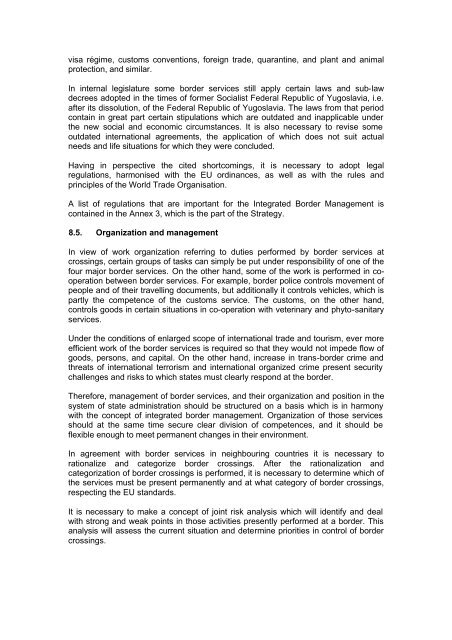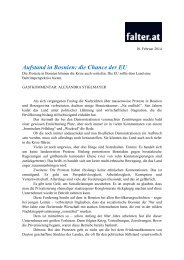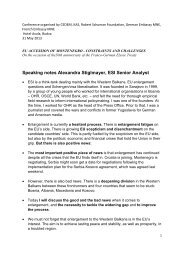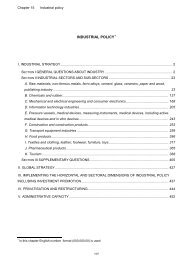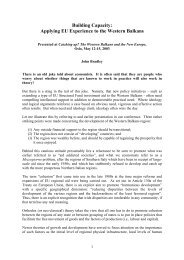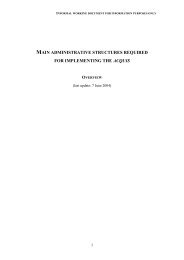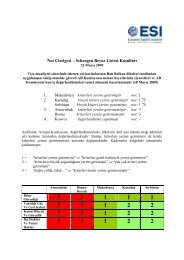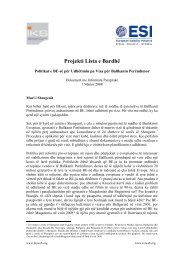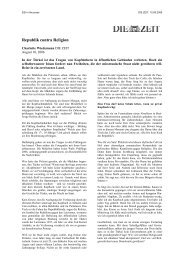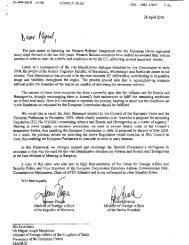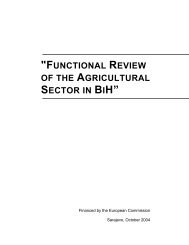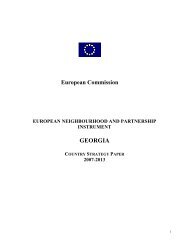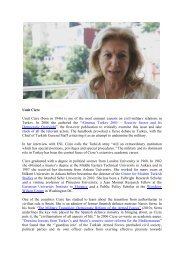Strategy for integrated border management
Strategy for integrated border management
Strategy for integrated border management
Create successful ePaper yourself
Turn your PDF publications into a flip-book with our unique Google optimized e-Paper software.
visa régime, customs conventions, <strong>for</strong>eign trade, quarantine, and plant and animal<br />
protection, and similar.<br />
In internal legislature some <strong>border</strong> services still apply certain laws and sub-law<br />
decrees adopted in the times of <strong>for</strong>mer Socialist Federal Republic of Yugoslavia, i.e.<br />
after its dissolution, of the Federal Republic of Yugoslavia. The laws from that period<br />
contain in great part certain stipulations which are outdated and inapplicable under<br />
the new social and economic circumstances. It is also necessary to revise some<br />
outdated international agreements, the application of which does not suit actual<br />
needs and life situations <strong>for</strong> which they were concluded.<br />
Having in perspective the cited shortcomings, it is necessary to adopt legal<br />
regulations, harmonised with the EU ordinances, as well as with the rules and<br />
principles of the World Trade Organisation.<br />
A list of regulations that are important <strong>for</strong> the Integrated Border Management is<br />
contained in the Annex 3, which is the part of the <strong>Strategy</strong>.<br />
8.5. Organization and <strong>management</strong><br />
In view of work organization referring to duties per<strong>for</strong>med by <strong>border</strong> services at<br />
crossings, certain groups of tasks can simply be put under responsibility of one of the<br />
four major <strong>border</strong> services. On the other hand, some of the work is per<strong>for</strong>med in cooperation<br />
between <strong>border</strong> services. For example, <strong>border</strong> police controls movement of<br />
people and of their travelling documents, but additionally it controls vehicles, which is<br />
partly the competence of the customs service. The customs, on the other hand,<br />
controls goods in certain situations in co-operation with veterinary and phyto-sanitary<br />
services.<br />
Under the conditions of enlarged scope of international trade and tourism, ever more<br />
efficient work of the <strong>border</strong> services is required so that they would not impede flow of<br />
goods, persons, and capital. On the other hand, increase in trans-<strong>border</strong> crime and<br />
threats of international terrorism and international organized crime present security<br />
challenges and risks to which states must clearly respond at the <strong>border</strong>.<br />
There<strong>for</strong>e, <strong>management</strong> of <strong>border</strong> services, and their organization and position in the<br />
system of state administration should be structured on a basis which is in harmony<br />
with the concept of <strong>integrated</strong> <strong>border</strong> <strong>management</strong>. Organization of those services<br />
should at the same time secure clear division of competences, and it should be<br />
flexible enough to meet permanent changes in their environment.<br />
In agreement with <strong>border</strong> services in neighbouring countries it is necessary to<br />
rationalize and categorize <strong>border</strong> crossings. After the rationalization and<br />
categorization of <strong>border</strong> crossings is per<strong>for</strong>med, it is necessary to determine which of<br />
the services must be present permanently and at what category of <strong>border</strong> crossings,<br />
respecting the EU standards.<br />
It is necessary to make a concept of joint risk analysis which will identify and deal<br />
with strong and weak points in those activities presently per<strong>for</strong>med at a <strong>border</strong>. This<br />
analysis will assess the current situation and determine priorities in control of <strong>border</strong><br />
crossings.


